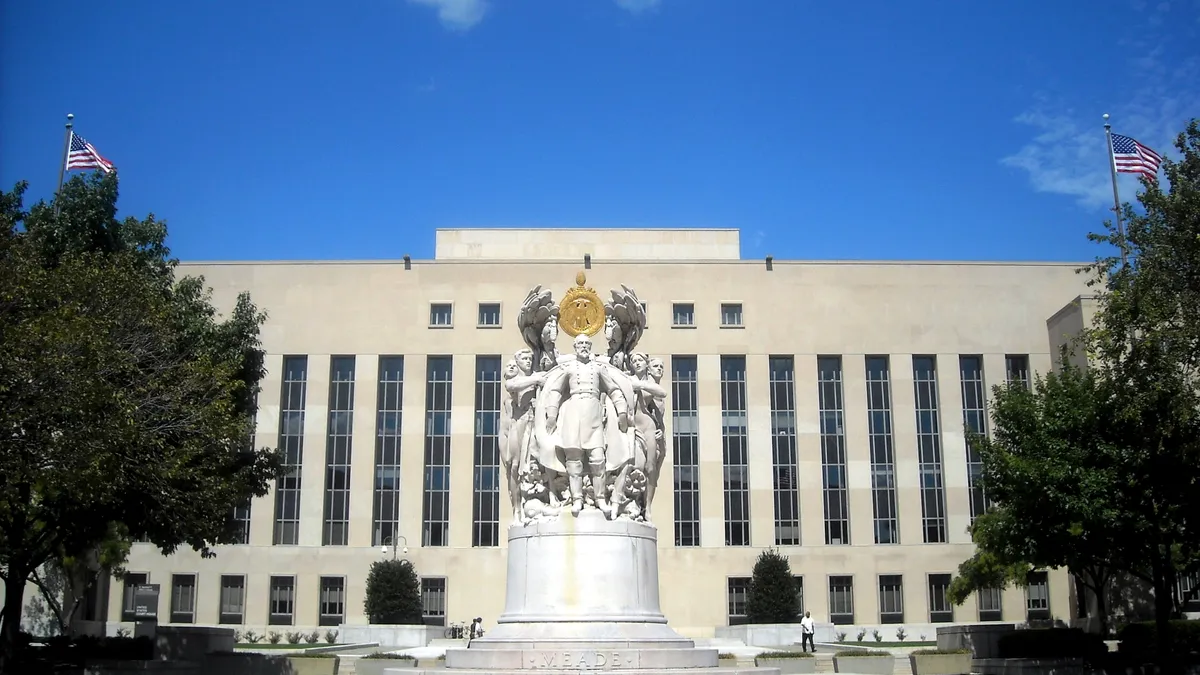Dive Brief:
-
The U.S. Court of Appeals for the District of Columbia Circuit ruled Friday that a federal storage order does not encroach on states' authority over the distribution system.
-
A three-judge panel of the court said the Federal Energy Regulatory Commission's 2018 Order 841, intended to expand the ability of storage to participate in wholesale power markets, does not surpass the commission's jurisdiction with its section preventing states from broadly prohibiting energy storage's participation in those markets. An attorney representing the National Association of Regulatory Utility Commissioners (NARUC) said during oral arguments in May that that section of the rule was an attempt to "curtail state authority" over the distribution system.
-
FERC Chair Neil Chatterjee and clean energy advocates praised the decision. "I'm obviously very pleased with this news," Chatterjee told reporters. "I think 841 … [may be] one of the single most significant ... actions taken by a government agency to address carbon mitigation and the transition to a clean energy future."
Dive Insight:
FERC's storage order is broadly seen by the storage and clean energy sector as an essential tool to further the deployment of energy storage, and the D.C. Circuit affirmed the commission is within its legal authority under the Federal Power Act to ensure storage rules and practices affecting wholesale rates are "just and reasonable."
"The DC Circuit denied the petitions challenging FERC's order on jurisdictional grounds and upheld our order on the merits," said Chatterjee. "The court found our actions to be well within our statutory authority," he said, adding the ruling was a "very significant victory."
The issue raised in the case was whether FERC was overstepping its bounds by enforcing its authority over state distribution systems. The specific language in question was the order's directive that states may not "broadly prohibit" energy storage from participating in federally regulated wholesale markets.
During May arguments, the three judge-panel pressed NARUC on whether any of its member organizations could point to any harm that would come from this ruling, or if there were any states in particular that wanted to potentially limit storage from participating in wholesale markets. NARUC maintained it was more about the order taking away "one of the tools in their toolbox."
But the D.C. Circuit determined Friday that Order 841 directly regulates a matter that deals with wholesale rates, and does not exert undue authority over state-regulated facilities. The order "solely targets the manner in which an [energy storage resource] may participate in wholesale markets," an "action ... intentionally designed to increase wholesale competition, thereby reducing wholesale rates," the court writes.
In that way, the court also maintains state authority regarding its distribution system under the rule, Jeff Dennis, general counsel and managing director at Advanced Energy Economy told Utility Dive in an email.
"Among other things, the court confirms that states retain all of the authority they had prior to Order No. 841 to design comprehensive retail programs to capture the benefits of energy storage and similar distributed energy resources," he said. "Preserving the authority of the states to design these comprehensive programs, while opening wholesale markets to participation by innovative distributed energy technologies, provides a strong foundation for maximizing their utilization for the benefits of all customers and the reliability and resilience of the grid."
Storage advocates also praised the ruling as "an enormous step for energy storage."
"This latest affirmation of Order 841 is especially important as it ensures energy storage can contribute all its values to the grid, regardless of its connection point," Energy Storage Association CEO Kelly Speakes-Backman said in a statement.
NARUC is "of course, disappointed in the Court's decision," spokesperson Regina Davis told Utility Dive in an email. "Right now, we are still reviewing the opinion and weighing our options."















